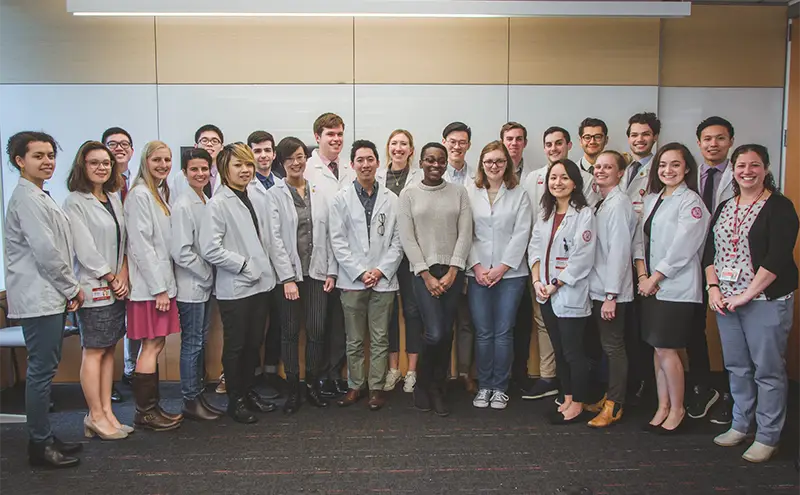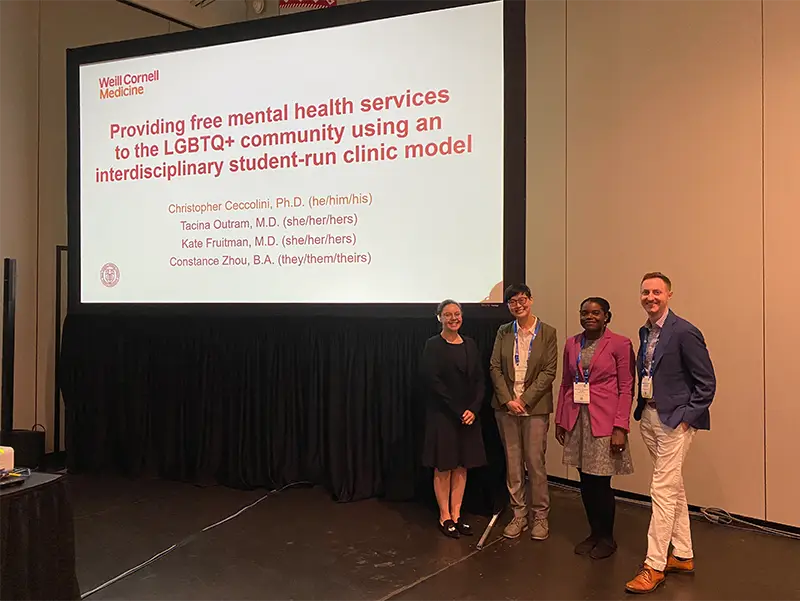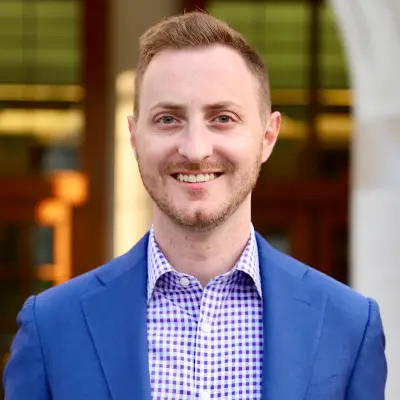New York City is home to approximately 756,000 LGBTQ+ people, a diverse population with specific and unique mental health needs that haven’t always been sufficiently met by providers. Historically, they have faced barriers to care, and many have had prior negative healthcare experiences that have led to a mistrust of medical providers. To improve access to gender-affirming mental health care and resources, NewYork-Presbyterian and Weill Cornell Medicine run the Weill Cornell Medicine Wellness Qlinic, the first student-run standalone mental health clinic in New York providing free care to LGBTQ+ New Yorkers 18 and older, regardless of insurance status, with priority for those who are uninsured or underinsured.
Stigma, prejudice, discrimination from family and friends, and experiences of heteronormativity and cisnormativity — the cumulative developmental experiences of queer individuals set up those disparities to emerge in adolescence and adulthood.
— Dr. Christopher Ceccolini
Founded in 2017 by two first-year medical students, the clinic used infrastructure already in place for other student-run clinics to begin seeing patients in 2019. “The LGBTQ+ community experiences significant disparities when accessing care,” says Christopher Ceccolini, PhD, faculty advisor and research director of the Wellness Qlinic and a psychologist at NewYork-Presbyterian and Weill Cornell Medicine. “Stigma, prejudice, discrimination from family and friends, and experiences of heteronormativity and cisnormativity — the cumulative developmental experiences of queer individuals set up those disparities to emerge in adolescence and adulthood.”

The Wellness Qlinic provides trainees, residents, externs and fellows the opportunity to early clinical experience, including with dialectical behavioral therapy.
All these factors contribute to LGBTQ+ individuals being twice as likely to have a mental health disorder in their lifetime, and finding a clinician who provides gender-affirming care can be daunting. “It can be really difficult in these spaces when you encounter a provider who wants to help you on paper but doesn’t know all the unique things you’ve gone through,” Dr. Ceccolini adds. “When I meet LGBTQ+ individuals in therapeutic spaces, they are often quite concerned. One of our goals is to make them feel comfortable and welcomed to help alleviate their concerns.”
Sharing Best Practices and Lessons Learned
Dr. Ceccolini and Tacina Outram, MD, faculty advisor and clinical director of the Wellness Qlinic and a psychiatrist at NewYork-Presbyterian and Weill Cornell Medicine, along with two of the clinic’s volunteers, current Weill Cornell Medicine psychiatry resident Kate Fruitman, MD, and Constance Zhou, current Weill Cornell Medicine MD/PhD student and co-founder of the Wellness Qlinic, presented details of the program at the American Psychiatric Association’s 2024 annual meeting. “We shared our model of care as a model that other medical schools might be able to replicate,” says Dr. Ceccolini.

Members of the Wellness Qlinic presented their model of care at APA for other schools to learn from and potentially replicate.
The clinic is entirely volunteer-run, with the majority of volunteers composed of first- and second-year medical students, psychiatry residents, and psychology externs/fellows, according to Dr. Outram. Before they start volunteering, staff must complete training on LGBTQ+ culturally responsive treatment, adapted to experience level. Faculty volunteers also complete their own training in affirming and inclusive mental health care to gain further background about the lived experiences of the LGBTQ+ community.
The clinic operates on Wednesday evenings, and medical students and residents volunteer their time to do either medication management or individual psychotherapy. Once a patient requests an appointment, volunteers set them up for an initial intake, which usually happens with either a second-year resident who rotates through the clinic or with a senior medical student and an attending physician. Attending psychiatrists volunteer to supervise and co-sign progress notes completed by students and trainees at the end of each clinic session.
Since 2019, the clinic has seen almost 100 patients and has a high retention rate (>90%). Of those patients:
- 60% reported their sexual orientation as queer
- 42% identified as transgender
- Nearly 60% had mood disorders
- Over 50% had anxiety disorders
- Over 80% reported experiencing physical or sexual assault in their lifetime.
Over that time frame, the clinic has had 227 volunteers, ranging from attendings to medical students.
| Volunteer Position | Numbers to Date |
|---|---|
| Medical students | 117 |
| Psychiatry residents | 48 |
| Attending psychiatrists | 16 |
| Therapy supervisors (i.e., psychiatry and psychology faculty, social workers) | 25 |
| Child/adolescent psychiatry fellows | 6 |
| Psychology intern/fellows | 7 |
| Pre-medical students | 4 |
| Social workers | 3 |
| Graduate students | 1 |
| TOTAL | 227 |
The presenters highlighted the strengths and weaknesses of a modified student-run clinic model to provide mental health services for underserved communities and identified the importance of early training exposure and vertical mentorship to building cultural competency in mental health care.
“It was really great to connect with other people so that they could receive support from us in what they’re doing already in their communities or what they are interested in trying to do in the future,” says Dr. Ceccolini.
Earlier Hands-on Experience for Trainees
In addition to addressing clinical needs, the Wellness Qlinic focuses on both education and research. “Medical students traditionally don’t get hands-on experience with patients until their third year,” says Dr. Outram, who volunteered at the Wellness Qlinic when she was a child psychiatry fellow in 2019.
Dr. Ceccolini adds, “We often provide first- and second-year medical students with one of their first clinical exposures. Getting this very early on in their training helps them make a really informed decision about what they can look forward to if they pursue psychiatry.”
One unique area of exposure for students and trainees is dialectical behavioral therapy (DBT). The clinic’s goal is to run two DBT groups a year, which are led by medical students and supervised by Ramsay Russel, LCSW, a DBT clinician. The Wellness Qlinic team, including Dr. Ceccolini and Dr. Outram, recently published a paper in Academic Psychiatry exploring the experiences of preclinical medical students leading DBT groups for the Wellness Qlinic. The study covered nine iterations of group DBT involving 18 student leaders and 30 patients. Twelve of the student facilitators were interviewed and reported improved clinical skills, increased appreciation of psychotherapy as a treatment modality, and an increased interest in utilizing psychotherapy in their future practice. The students also took away a lot from DBT personally:
- 83% reported using the DBT skills they learned to improve their well-being during clerkship year
- 42% reported that the DBT skills themselves were the biggest takeaways from the program
- 17% detailed use of specific interpersonal effectiveness skills to help maintain their relationships during medical school
I am completely in awe and so impressed by the students who had the vision and decided to seek out the support needed to get the Wellness Qlinic started. Our student volunteers always show such great dedication and commitment to providing excellent patient care to our underserved patient population.
— Dr. Tacina Outram
Future Plans
On top of providing its regular services, the Wellness Qlinic will explore ways to incorporate digital technologies and other advancements to help provide care to more patients. But one thing will remain the same – the students and trainees will continue to lead the clinic.
“I am completely in awe and so impressed by the students who had the vision and decided to seek out the support needed to get the Wellness Qlinic started,” says Dr. Outram. “Our student volunteers always show such great dedication and commitment to providing excellent patient care to our underserved patient population
Dr. Ceccolini adds, “We have a long lineage of students who are really committed to the mission of working with LGBTQ+ populations, and that’s remarkable. I’m really proud of the students and of the institution for supporting it so thoroughly.”





